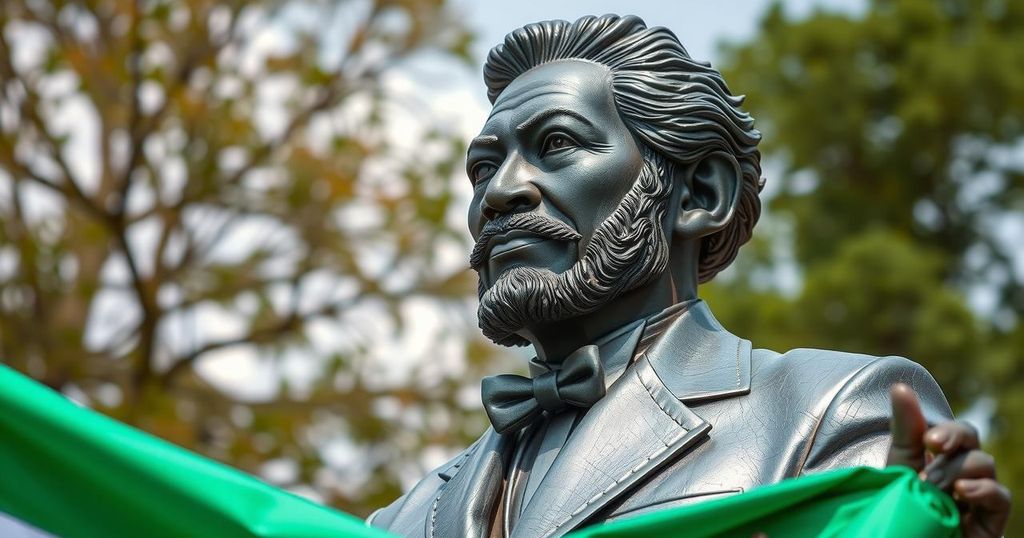The Central African Republic (CAR) has unveiled a statue honoring Russian mercenary leader Yevgeny Prigozhin, symbolizing gratitude for Russia’s role in ensuring security since 2017. Despite its wealth in natural resources, CAR remains impoverished, leveraging military partnerships for stability while grappling with the implications of external influence on internal affairs. The ongoing relationship reflects broader trends in African nations seeking military agreements for resource control amidst persistent conflict and economic challenges.
The Central African Republic (CAR) has solidified its allegiance to Russia by erecting a monument honoring Yevgeny Prigozhin, the late leader of the Wagner Group, alongside his associate Dmitriy Utkin, in the capital city of Bangui. This statue symbolizes CAR’s appreciation for Russia’s essential role in providing stability and security in the nation following years of civil unrest and political turmoil. Since Russian military forces arrived in 2017, there have been reports suggesting significant contributions to restoring order and assisting the government amid longstanding ethnic and political conflicts.
Central Africa, home to roughly 5.4 million residents, is endowed with abundant natural resources including diamonds, gold, and oil, yet it continues to grapple with severe poverty, ranking as one of the world’s ten poorest countries. The Wagner Group, under a military-technical cooperation agreement, gained access to extract the country’s resources, which has led to discussions within the regional context on how to leverage natural wealth for national security. This collaboration has ostensibly been framed by President Faustin-Archange Touadéra as a necessary defense against armed insurgents. After the untimely deaths of Prigozhin and Utkin in a plane crash on August 23, 2023, the status of the Wagner Group as a key stabilizing military force in CAR remains significant.
Following the arrival of Russian forces, President Touadéra has openly endorsed their presence, emphasizing the reversal of security threats once dominant in 80% of the country’s territory. He has maintained consistent dialogue with the Kremlin, expressing gratitude for Russian support and fostering military ties that contrast with historical relationships with former colonial powers. This strategy mirrors a broader pattern observed in other Francophone African nations, which may seek similar arrangements given their respective security challenges and financial predicaments.
Amidst increasing scrutiny over foreign military partnerships, African leaders such as Ethiopia’s Prime Minister Abiy Ahmed and Mozambique’s President Filipe Nyusi have called for self-reliant conflict resolution strategies. They have advocated for localized military collaborations that do not necessitate relinquishing national resources for security purposes. Given the rich resources available in CAR, the conversation surrounding resource-control dynamics and foreign military influence remains pivotal.
The historical context is vital to understanding CAR’s current predicament. Since gaining independence from France in 1960, the country has oscillated between autocracy and fleeting democratic transitions, resulting in recurrent civil strife and human rights violations. Current political leadership, represented by President Touadéra, is attempting to establish a stable governance structure that leverages international relationships to foster both economic development and internal security.
The Central African Republic has long struggled with governance issues and civil conflict, marked by a variety of coups and political instability since its independence. Following years of turmoil, the arrival of Russian military forces through the Wagner Group in 2017 has been pivotal in altering the security landscape. The government’s reliance on foreign military support reflects both a strategic alliance for stability and an avenue for exploiting the nation’s natural resources. This is underscored by the statue’s unveiling, which represents CAR’s deeper ties and commitment to Russian assistance. Additionally, the broader context highlights a trend among African states reassessing their post-colonial relationships in light of contemporary security challenges, seeking to strike a balance between autonomy and the need for external military support against internal strife. Understanding the historical trajectory of CAR, including its rich mineral deposits juxtaposed with pervasive poverty, showcases the complexities faced by the nation in restoring peace and fostering development. As such, the dynamics of foreign partnerships raise essential questions about resource management and national sovereignty.
The unveiling of the statue commemorating Prigozhin and Utkin in the Central African Republic has reinforced the country’s strategic partnership with Russia amidst ongoing security challenges. While this alliance has delivered critical military support in a tumultuous political landscape, it equally prompts discussions about the implications of exchanging national resources for security. As CAR navigates its path forward, the dialogue surrounding self-reliance and regional cooperation remains central to its future stability and growth.
Original Source: moderndiplomacy.eu






